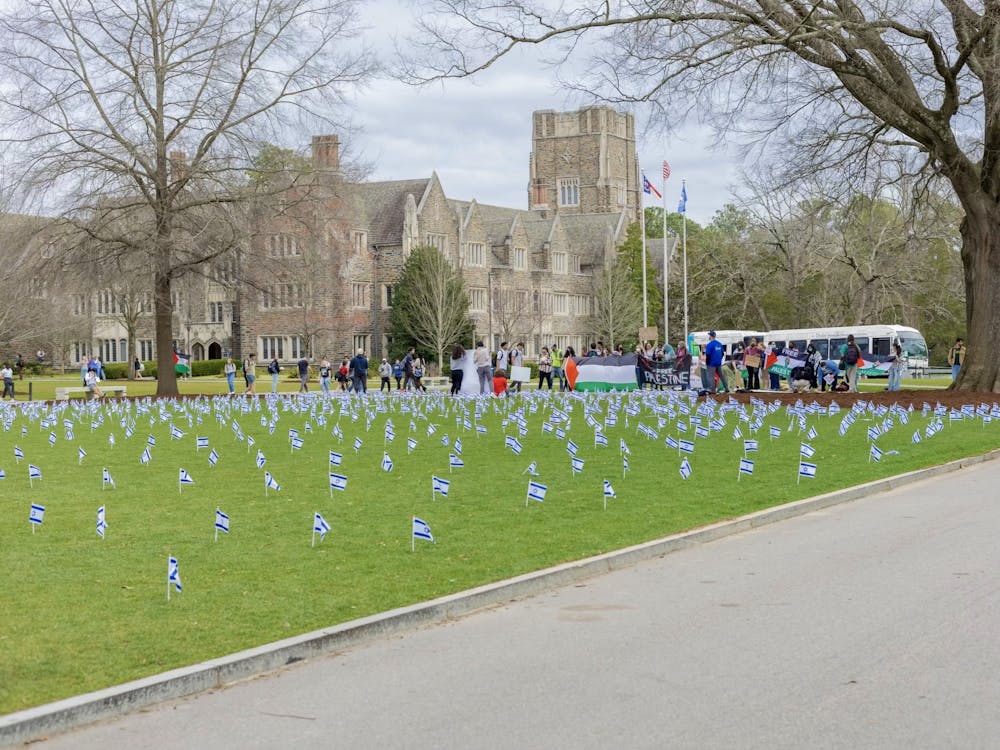Duke recently announced nine new Bass Connections project teams for the fall under a new pop-up theme of “geopolitical conflict and humanitarian crises in the Middle East and beyond.”
The new teams were organized in partnership with the Provost’s Initiative on the Middle East after faculty members approached Bass Connections leadership with ideas for projects related to the Israel-Hamas war.
Four of the new teams have a direct focus on the ongoing conflict in Gaza, while four others concern the Middle East more broadly. The final project team looks at humanitarian aid delivery efforts in South Sudan.
“We just realized that faculty and students were seeking opportunities to engage in these issues in a constructive and substantive way,” said Laura Howes, assistant vice provost of interdisciplinary studies and Bass Connections.
Traditional Bass Connections projects are organized around six standing themes: brain and society; energy and environment; global health; health policy and innovation; information, society and culture; and race and society. But in 2018, Howes said the program began releasing pop-up themes to provide students and faculty with opportunities to “grapple with very timely issues.”
“The pop-ups are really designed just to recognize that there are emerging issues all the time, and we want to create space for faculty and students to engage in those issues thoughtfully and intentionally,” Howes said.
Previous pop-up themes have included hurricane recovery and resilience, immigration, the COVID-19 pandemic, strengthening democracy in a polarized world and Duke’s Centennial.
Bass Connections put out a special call May 21 for faculty submissions of new project teams under the “international geopolitics and humanitarian crises” pop-up theme, which were due July 12.
The Israel-Hamas war has been a polarizing force on many college campuses since the Oct. 7 attacks by Hamas on southern Israel. At Duke, students have held a number of demonstrations calling for the release of Israeli hostages and an immediate cease-fire in Gaza, while University administration has released statements advocating for “respectful and compassionate learning” and organized several speaker events in an effort to promote thoughtful discourse.
Bruce Jentleson, William Preston Few distinguished professor of public policy and leader of the Provost’s Initiative, hopes the teams will allow students to take concrete action on issues they feel passionately about.
“Here I think is a chance for students — whether it’s in addition to protesting or … instead of that — to have some impact that can be constructive and positive,” Jentleson said.
He added that the new Bass Connections projects are not intended to “make protests … go away,” but instead to allow community members “the chance to learn from [the conflict] too.”
Howes emphasized that the projects represent “very diverse teams” that “intersect with a broad range of issues.”
“We also want to recognize that the Middle East is not the only … place in the world that is facing international conflict,” Howes said, hoping the diverse array of projects will allow for “comparative analysis.”
“There’s different history and context, but there’s also things that we’re hoping can be shared and learned across these different places,” Howes said.
The priority application deadline for the new teams is 5 p.m. Aug. 14, after which applications will be reviewed on a rolling basis for any remaining positions.
Nineteen additional Bass Connections teams from the regular cycle are still accepting new applications, which are also due 5 p.m. Aug. 14.
Get The Chronicle straight to your inbox
Sign up for our weekly newsletter. Cancel at any time.

Zoe Kolenovsky is a Trinity junior and news editor of The Chronicle's 120th volume.

